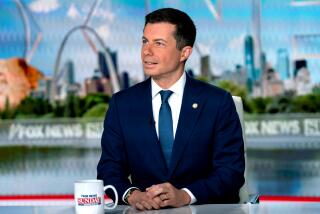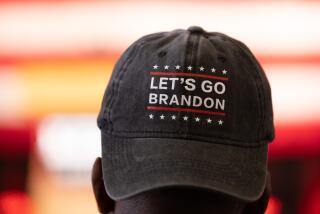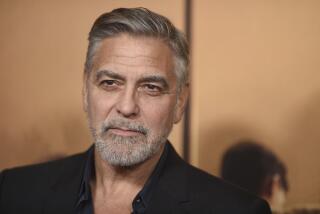By Stepping Out of His Old Role, Gore Steps Up Campaign
- Share via
NASHVILLE — Until that moment in late September, Al Gore had seemed the very caricature of himself: A wooden figure, no more animated than the seal of his office.
Then, taking the stage at a meeting of the Democratic National Committee in Washington, he stepped around his lectern and edged toward his audience. It was a simple gesture, and yet with it Gore literally and symbolically put the confines of office behind him, the vice presidential seal now hidden by his 6-foot-1 frame.
Standing in the back of the hotel ballroom, John Sweeney, the politically astute president of the AFL-CIO, let a smile cross his face. The significance was obvious: Gore--tied down by his office and a quarter-century of political meticulousness that weighed the consequences of each syllable--was signaling a readiness to take charge.
And from that day on, Gore and his key advisors agree, his presidential campaign was marked by an improvement in both style and message that culminated in a series of primary victories Tuesday that appear to assure him his party’s nomination.
Gore Talks of Changing Mind-Set
Gore recently reflected on the constraints he had felt as he began his presidential bid, restrictions that helped Bill Bradley launch a surprisingly spirited challenge.
“For seven years,” Gore said, “I paused a split second to ask myself: ‘OK, how’s this going to help the administration? How’s this going to help the president? What’s the administration’s policy? And how can I make sure that it’s reconciled with what I think about this?’ ” Gore said.
But as he psychologically freed himself from that mind-set last fall, a liberation telegraphed at the DNC meeting, all that changed. The campaign supplanted his official duties as his priority.
Now, he said, the questions he asks himself have a different focus: “What do I think about this? Is it going to work for the country? Is it right for the American people? And that’s a simpler process by far--and it’s a lot more fun.”
To be sure, Bradley’s many tactical mistakes and shortcomings as a campaigner greatly contributed to Gore’s comeback.
Still, Gore’s resurgence was sparked by a series of key developments throughout the last months of 1999: the move of his headquarters from Washington to Nashville; the hard-fought endorsement by the AFL-CIO in Los Angeles, akin to a primary itself; one dramatic challenge after another, slapped in Bradley’s face at debates and party dinners. And through it all, Gore displayed an ability to grind his way to his goal--at one moment earnest, at another huggingly tender, at yet another fiercely partisan.
Until the Bradley campaign took flight over the summer, Gore’s only opponent was himself; he had no one, other than Al Gore, against whom he could draw a contrast and was, therefore, in the words of a senior aide, “punching at shadows.”
But Bradley’s fund-raising success and his surge in crucial polls forced Gore to engage him. And that worked to the vice president’s benefit.
Bradley’s Goal Worked Against Him
Bradley had set a nearly impossible goal for himself: to run a “nonpolitical” campaign, holding himself above the fray. So, when Gore attacked, his opponent had but two choices: to refuse to respond or to respond and thus be seen as plunging into the political mire despite his promise not to do so.
“Gore the fighter versus Bradley the philosopher king played to Gore’s strength,” said an advisor to the vice president. “Most people had thought Gore had a wooden style and Bradley was charismatic. But when they were on stage together, Gore looked like a better candidate.”
The wake-up call for the Gore campaign had come in early September in the form of a Boston Globe poll. Suddenly, the former senator, little known outside the Northeast, was in a virtual tie in New Hampshire, site of the first presidential primary, with the man who had been vice president for nearly seven years. Gore and his advisors were stunned.
At the outset of the lengthy presidential political season, Gore had been hampered by the sex scandal plaguing President Clinton. He believed it would have been unseemly to work directly on his own White House bid when Clinton faced impeachment. So he delayed the start of his campaign by close to a year, Gore confidants say.
When the campaign mobilized, it was saddled with an organization top-heavy with expensive Washington consultants and pollsters. Neither they nor the vice president had been paying attention to Bradley, particularly his formidable fund-raising.
Having adopted something of a Rose Garden strategy, Gore had approached Campaign 2000 as an effort to be waged against whomever the GOP would nominate; he assumed the Democratic nomination was his for the asking.
Bradley’s summer showing told him otherwise.
Gore abandoned as much as possible the trappings of his office. The black, armor-plated limousines stayed home; beige or dark-green armor-plated Chevy Suburbans took their place in Iowa and New Hampshire, even before the snow fell. Stump speeches were replaced by open meetings with undecided voters, a course Gore had to convince skeptical aides to take, one advisor said.
Some meetings lasted more than three hours, as the vice president of the United States stood in classrooms and barren meeting halls until everyone who wanted to question him had the chance to do so.
The sessions taught him “the music of this campaign,” Gore said.
He swapped his trademark dark-blue suits for earth-tone casual wear, to better connect with his audience, the vice president said. Critics said it was a symptom that he does not know who he is.
“He’s a chameleon,” said Sheila Burke, executive dean of Harvard University’s Kennedy School of Government and a former top Republican Senate aide. “With Gore, it’s almost as if he’s driven by the audience rather than his commitment.”
A Surprisingly Meek Response to Attacks
The reinvigorated Gore attacked unrelentingly. A practiced political brawler, he was more surprised than anyone, aides said, when Bradley failed to respond immediately to the vice president’s pointed criticisms of his signature health care plan. And when the former senator from New Jersey eventually took the bait, his response was meek.
Gore was so determined to press his attacks that he broke his perfect attendance record at his son’s high school football games and attended the annual Iowa Democratic dinner in October.
The payoff: An aide who had specialized up to then on direct-mail solicitations came up with a slogan with which Gore would hammer Bradley all winter: “Stay and fight.” It cast the spotlight on Bradley’s decision to quit the Senate two years after Republicans had grabbed control of Congress, and in the process raised doubts about his credentials among party loyalists.
Gore is wont to say that having run for office against challengers and having run unopposed, he much prefers the latter. But he and his advisors now argue that the vice president is much the better candidate for the scare that Bradley caused.
As Gore himself puts it: “My preference [for an uncontested primary contest] would have been to my detriment.”
More to Read
Get the L.A. Times Politics newsletter
Deeply reported insights into legislation, politics and policy from Sacramento, Washington and beyond. In your inbox twice per week.
You may occasionally receive promotional content from the Los Angeles Times.










